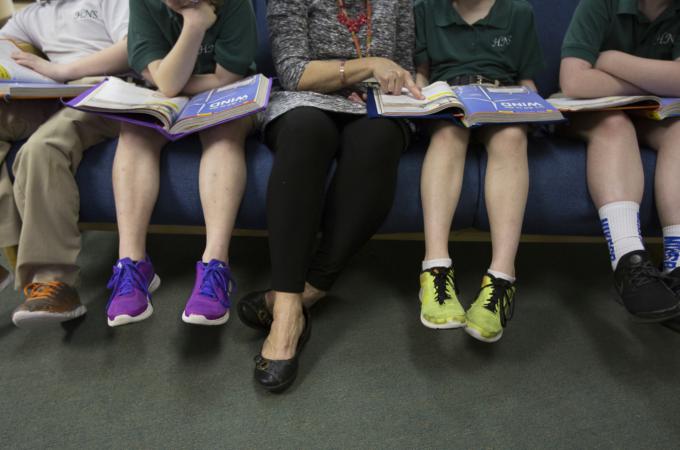Parents as teachers: A fresh appreciation
National Teacher Appreciation Day, May 5, slipped by again this year with nary a nod. It was vastly overshadowed by National Nurses Day, which was celebrated with the American public's loud manifestations of appreciation and with squadrons of military jets flying in formation, low over hospitals.
The country's annual day for teacher appreciation, a creation of the teacher's union, has been for years just another made-up occasion, along with National Meat Packers Day and American Dog Walkers Day.
While the Teacher Appreciation Day may have slipped by again, mothers and fathers across our fruited plains have a fresh respect for the work of teachers. They have been quarantined in their makeshift classrooms for eight or so weeks, and they have made some discoveries. They thought they knew how to do long division, but, alas, no. And are there two quarts in a gallon or four? And the scientific principle explaining why oil floats on water -- that, too, has slipped down the memory hole.
Then there is that piece of educator's jargon, "classroom control," a softer term than the old fashion "discipline." If mom or dad can't get Sabrina to focus on her workbook for more than three minutes or keep Buster from browsing porn sites, how does a teacher with 20 kids do it for six hours! America's teachers are next in line to receive recognition from a grateful nation. A fly over, perhaps!
Besides the inevitable realization of how complex and demanding teaching children skills and concepts actually is, the entire topic of schooling is gaining increased prominence. Also, the issue of school choice versus the current monopoly of government-sponsored public schools, which has been simmering for some time, is bubbling up to the surface.
Homeschooling, in particular, is coming in for special attention. In a matter of days, the percentage of the nation's 55 million students who were being homeschooled jumped from 3 percent to 100 percent. And here there is good news and bad news for advocates for homeschooling.
Anecdotal evidence suggests that the great majority of parents would rather have a life sentence chained to an oar on a galley ship than continue their enforced homeschooling job. Others, and granted a small percentage, are experiencing the stimulating challenges that the millions of parents who have been doing it for years know -- that teaching your own children is a deeply satisfying and bonding experience.
Such thoughts are deeply worrying for public school administrators and their powerful supporters, the teacher unions. A major concern is not education, but money. America's public schools spend on average $15,000 in taxpayer money a year per pupil. (The average in Boston and the surrounding area is much higher.) If only 2 percent of families decided next September to homeschool or send Sabrina or Buster to a religious or private school, the public schools would lose close to a million students at a cost of $15 billion. The fight over school choice is on!
Harvard University has joined this fight. It's been a bad spring for the school. First, the university with an endowment of $41 billion requested a COVID-19 bailout from the federal government and received $9 million. However, after widespread public shaming, Harvard quietly returned money. Next, it was revealed that the late Jeffrey Epstein, a convicted child-sex offender, had made major donations and thus had major impact on the university's policy. It appears to have been efforts to burnish his faltering reputation.
But if that wasn't enough, a senior professor of the Harvard Law School faculty, Elizabeth Bartholet, decided to take on homeschooling. In June, Harvard scheduled an invitation-only "summit" on homeschooling, questioning parents' rights to educate their own children at home. Ignoring facts such as two-thirds of public school students are not proficient in reading and math, and the research that shows homeschooled students are better off academically and socially than their public school counterparts, Professor Barthholet has asserted that the rights of the state to educate children supersede that of parents. She argues for a "presumptive ban" on homeschooling because of the likelihood that parents will take an "authoritarian" attitude toward their children. In essence, your children belong to the state. Because of COVID-19 and possibly because of rising opposition to the Harvard conference's organizing principle: "Children belong not to their parents, but the state," the conference has been postponed for a year. Stay tuned!
Nevertheless, the professor remains worried about homeschooling parents, since they may be ideologically committed to views and values at odds with those of public school. As if our government-run schools are not swimming in the secular ideology on a host of controversial issues.
The arrival of COVID 19 and the uneven performance of our public schools is a prime opportunity for Catholics to reassess the entire issue of school choice: public, private, religious, charter, and homeschooling. An important part of this decision should be an evaluation of state-sponsored education with its progressive curriculum of dubious sex education, unquestioning support of climate change, transgender rights and complete silence on life's religious realities. Contrast that with the "authoritarian choice" of a classical Catholic education, an education in history, mathematics and science and, also, that we are all children of God.
- Kevin and Marilyn Ryan, editors of "Why I'm Still a Catholic," worship at St. Lawrence Church in Brookline, Mass.



















